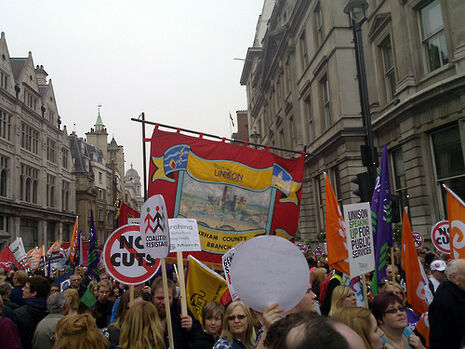Support your striking staff
Ben Gliniecki urges you to get behind staff in the dispute over pay ahead of joint strike action on Thursday

Come Halloween, a spectre will be haunting the coalition government – the spectre of joint strike action between UCU, Unite and Unison. The action being taken by academic and non-academic staff serves to highlight the atrocious conditions being forced on people by this crisis of capitalism. This strike is a fight against staff being made to pay for a crisis they didn’t cause and so, in essence, it is the same battle that we’re fighting for free education, against cuts to courses and against tuition fees.
Taking inflation into account, the last five years have seen a pay cut for university staff of 13 per cent. But even this understates the real situation because the price of many basic necessities such as food, rent and energy have increased at a rate well above inflation. The offer of a 1 per cent pay increase this year when inflation stands at 2.7 per cent would be laughable if it weren’t so deadly serious.
In voicing their anger at this state of affairs, university staff are voicing the anger of millions. Healthcare, pensions, wages, income support, disability benefits and emergency services are all suffering cutbacks. People are seeing their jobs, their houses and their standard of living sacrificed on the altar of capitalism, to pay back the debts of the banks. We’ve seen tuition fees treble, and now face the sale of that debt by the government to private companies. We’ve seen university funding slashed and the resulting commercialisation of our colleges and the University as a whole. What is happening to university staff now is a symptom of a diseased system that is attacking almost everyone.
Of course there are a tiny handful who don’t see the problem. For example, the average wage of a university vice-chancellor is £250,000 while college masters receive a hefty five-figure sum on top of the regular salary for academic staff. Many might ask why there is enough money to pay the university establishment six-figure salaries while ordinary staff take pay cuts. Students and staff suffering from wage cuts and price increases are unlikely to find a sympathetic ear in the oak-panelled, port-soaked ivory towers at the top of the University. To these people, strike action is extreme, unnecessary and disruptive to our education. But it doesn’t take much reflection to realise that, if anything is extreme, unnecessary and disruptive to education, it’s five years of massive cuts to staff pay.

Strike action like this is vital to demonstrate that we’re not going to take these continued attacks on our living standards lying down. Students must lend their support to staff because it is all of us who are suffering these attacks. We all know what it is that we are fighting against, but to be successful we’ve got to be clear about what we’re fighting for. Our demands aren’t outlandish or particularly radical, we want decent pay, pensions, education, housing, jobs, healthcare, transport, welfare and emergency services for everyone.
Paying university staff a decent wage, like all of those things listed above, costs money – money which we’re often told simply isn’t there. But that’s not entirely true because British businesses and banks are currently sitting on roughly £750 billion of cash. This money is, quite literally, doing nothing. It is not being invested because there’s nothing profitable in which to invest it, and it’s not gathering interest because interest rates continue to bump along at rock bottom. While there is a great need to pay university staff properly, to alleviate the burden of student debt, to address the healthcare crisis etc. etc. there are hundreds of billions of pounds sitting around not doing anything because investing in these things won’t make the bosses any money. This is the logic of the capitalist system. It is not a case of “bad” capitalism that can be fixed by tweaking things here and there – it is the inevitable result of a system in which the bottom line is profit.
Members of the Cambridge Marxist Discussion Group have a solution to this situation which they’ve put into a motion that is being discussed by CUSU Council. They make it clear that if we are serious about defending the pay and conditions of university staff, we need to take these banks and big businesses into public ownership so that we can run them on the basis of need and not profit. On that basis we could easily do what capitalism cannot – pay university staff a decent wage, as well as get a long way to meeting all our other demands on education, healthcare and jobs too.
It is the role of CUSU, as a union that is supposed to defend the interests of students, to lead this fight. CUSU should actively support the strike and engage with the unions, encourage students not to cross picket lines, and to link up the demands of Cambridge students with those of the striking unions to fight against the cuts and for the public ownership of businesses and universities. It should be students and society as a whole that decides how much a vice-Chancellor should be paid, how much we invest in our university staff, and how all of society’s resources are distributed. CUSU must fight alongside staff and students by supporting the strike as a step in the struggle for socialism.
 News / Caius mourns its tree-mendous loss23 December 2025
News / Caius mourns its tree-mendous loss23 December 2025 Comment / Yes, I’m brown – but I have more important things to say22 December 2025
Comment / Yes, I’m brown – but I have more important things to say22 December 2025 News / Cambridge welcomes UK rejoining the Erasmus scheme20 December 2025
News / Cambridge welcomes UK rejoining the Erasmus scheme20 December 2025 News / CUP announces funding scheme for under-represented academics19 December 2025
News / CUP announces funding scheme for under-represented academics19 December 2025 Interviews / Politics, your own way: Tilly Middlehurst on speaking out21 December 2025
Interviews / Politics, your own way: Tilly Middlehurst on speaking out21 December 2025









